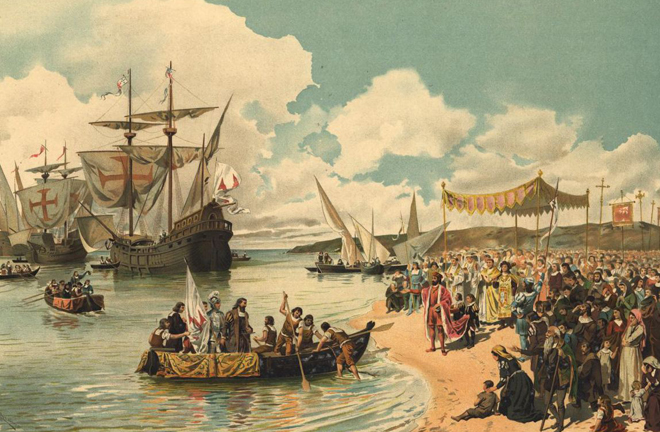Global history studies interconnected world

When Columbus discovered the new continent in 1492, the world entered a more interconnected age. Photo: FILE
With the increase of economic globalization, human society has gradually moved from a state of decentralization to a state of unity. As an emerging research field in history, global history has received considerable attention. Although the issue of seeing global history as an independent discipline or branch of world history is still controversial in academic circles, global civilization can without a doubt be considered an interconnected whole in the era of economic globalization.
Yang Juping, a history professor at Nankai University, said that the evolution of the concept of global history is closely related to the expanding scope of people’s worldview. The concept of global history is the product of economic globalization, and it provides a new perspective for the study of world history.
Meng Zhongjie, a professor at the Department of History at East China Normal University, said that compared with ethnic history and world history, global history pays more attention to global communication and the global interaction of historical events. Studying human history from a global perspective has become a hotspot and key research area of academic circles.
At present, the academic community has different views on the concept of global history and its relationship with world history. Yang said that there is no essential difference between global history and world history. Their objects of study are both based on past human activities or natural activities related to human beings. Instead of considering global history as a new research field or even a new discipline different from world history, it is better to regard it as a new branch or a new school of world history.
Dong Xinjie, an associate research fellow at the Institute of World History at the Chinese Academy of Social Sciences, said that the research of global history is an innovative concept and practice within world history. It can be said that global history is world history in the era of economic globalization. Global history has the same spatial and temporal category as world history. However, the entry point of global history research is significantly different from that of traditional world history, which focuses on the study of a certain ethnic group or country. Whether it is a general historical study or a monographic study, the inherent spatial and temporal framework of global history is built through research of cross-cultural interaction from a global perspective.
Meng said that compared with world history, the research of global history has distinctive features. It stresses the relationship between diachronicity and synchronicity. The study of world history generally focuses on diachronic development within a single country. In fact, synchronic connections in the same time and space should also be taken seriously. As economic globalization progresses with new challenges, global history, which traces the historical evolution of some concepts and actions such as environmental protection and cross-border cooperation, can provide guidance.
Compared with how traditional world history focuses on the history of individual countries, global history focuses on historical phenomena with global and holistic influences, such as world wars, worldwide natural disasters and cultural communication. But in any case, these phenomena are still within the research scope of world history, Yang said.
Meng said that there are some scholars committed to the study of the shared history between China and the United States. In the current era, research in this area is obviously of great significance. When building a community of shared future for humanity, the recording and study of shared history is essential, which includes topics such as environmental protection, disease treatment and crisis management. In the future, we should continue to promote relevant research from a global perspective and strengthen cooperation between universities and research institutions around the world.
Dong added that the study of China’s global history should proceed from China’s rich historical experience and general historical compilation practices. We should not only adhere to the standpoint of historical materialism, but also actively absorb the beneficial results of the research of Western global history to build a new system of world history research in the era of economic globalization.
edited by YANG LANLAN
